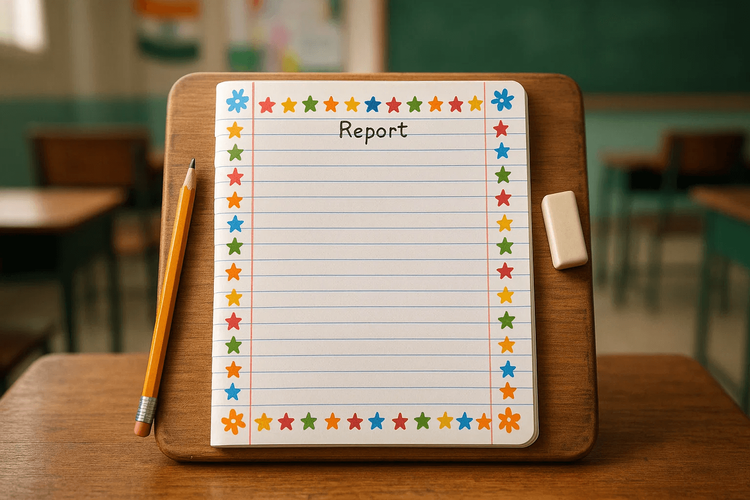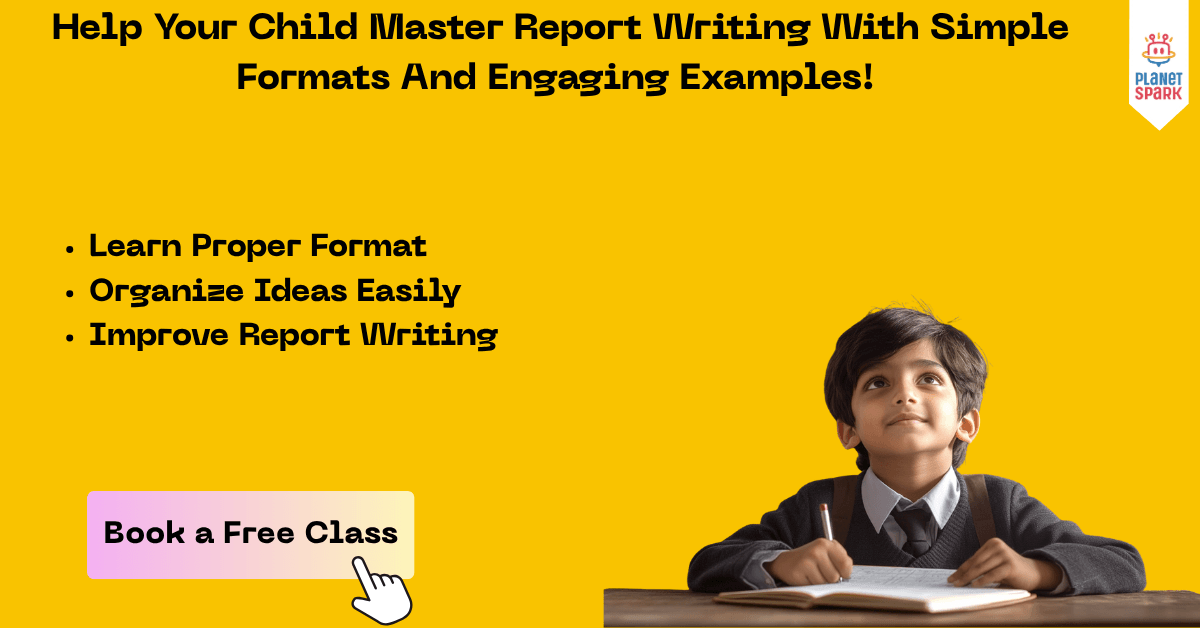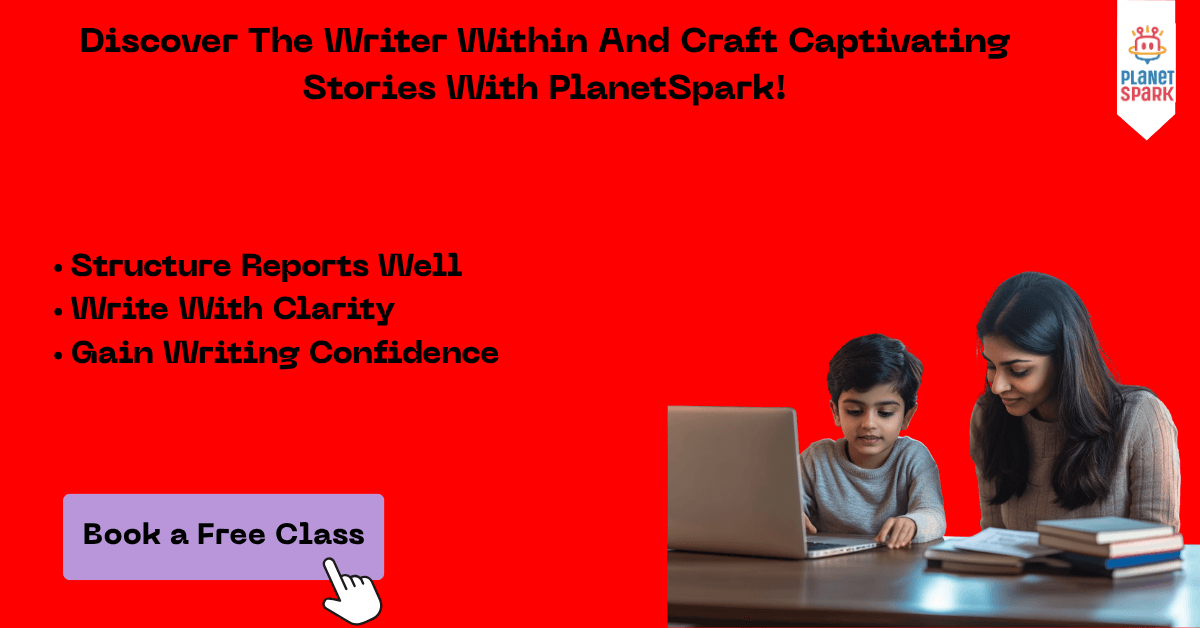Report Writing for Class 3 Students | Format & Examples

Table of Contents
- What is Report Writing? | Definition for Class 3 Students
- Report Writing Meaning for Class 3
- Why Report Writing Is Important for Class 3 Students
- Sample Report 1: A Visit to the Zoo
- Sample Report 2: Annual Sports Day
- Sample Report 3: My First Library Visit
- Essentials of Report Writing for Class 3 Students
- Classroom Activities & Practice
- Why Choose PlanetSpark’s Report Writing Course for Class 3
- Curriculum Overview: Report Writing for Class 3
- Course Duration and Certification Options
- Classroom Activities and Practice Tools
- Free Demo Classes
- Who Are the Teachers?
- Introducing PlanetSpark’s Creative Writing Course
- Conclusion
- FAQs: Report Writing for Class 3
Report writing is one of the fundamental writing skills taught in early English language classes. For students in Class 3, this skill is more than just an academic requirement; it is a gateway to structured thinking, effective communication, and confidence in language use. A report is a factual and unbiased summary of an event, observation, or reading. It involves structured writing with a clear beginning, middle, and end, focusing solely on facts and excluding personal opinions.
At PlanetSpark, the Report Writing Course for Class 3 has been thoughtfully designed for children aged 8 to 10 years. It helps young learners grasp the essence of professional report writing in a fun, age-appropriate, and interactive way.
What is Report Writing? | Definition for Class 3 Students
Report writing is a form of structured writing used to share information, observations, or facts in a clear and organized way. Unlike stories that entertain or essays that persuade, a report simply presents facts about something that has happened, been studied, or been experienced.
Report Writing Meaning for Class 3
For Class 3 students, report writing means describing an event, place, person, animal, or experience using simple sentences and clear ideas. Reports usually include what happened, when it happened, where it happened, who was involved, and why it was important.
It helps children:
Organize their thoughts.
Improve their understanding of a subject.
Learn how to explain something using real facts and observations.
Get ready for more complex writing in higher grades.
Key Characteristics of a Good Report:
Factual and objective – no personal opinions.
Organized format – uses headings, subheadings, and paragraphs.
Simple language – suitable for the writer’s age and grade.
Answering the 5Ws and 1H – Who, What, When, Where, Why, and How.
Example for Kids:
Imagine you went on a school trip to the zoo. A report will not say,
“It was so fun, and I loved the animals!” (That’s a personal opinion).
A good report would say,
“On Monday, Class 3 visited the city zoo. We saw lions, elephants, and giraffes. The zookeeper told us that giraffes sleep for less than two hours a day.”
This kind of writing shows what really happened and helps the reader understand the event clearly.

Why Report Writing Is Important for Class 3 Students
In today’s fast-paced academic landscape, writing structured content from an early age offers a strong competitive advantage. Report writing:
- Enhances analytical and observational skills
- Teaches objectivity and clarity in expression
- Builds a strong foundation for academic writing
- Develops a habit of organized thinking
Children who master report writing in Class 3 are better equipped to handle school assignments, projects, and even competitive exams in later years.
Sample Report 1: A Visit to the Zoo
Title: My Visit to the Zoo
Date: 10th March 2025
Reported by: Anaya Sharma, Class 3
Report:
Last Saturday, our class went to the city zoo for an educational trip. We saw many animals like lions, tigers, elephants, and zebras. The monkeys were very funny and kept jumping around. We also saw colorful birds in the birdhouse. My favorite part was watching the giraffes eat leaves from tall trees. Our teacher told us facts about each animal. We had our lunch under a big tree and came back in the afternoon. It was a fun and learning experience.
Sample Report 2: Annual Sports Day
Title: Report on Annual Sports Day
Date: 5th February 2025
Reported by: Aarav Mehta, Class 3B
Report:
Our school’s Annual Sports Day was held last Friday. All the students came in sports uniforms. The event started with a march-past. Many races, like sack race, running race, and relay race, were organized. I took part in the lemon-and-spoon race and came second. Our principal gave prizes to the winners. Parents also came to watch. Everyone cheered for their friends. The day ended with a dance performance. It was a very exciting day.
Sample Report 3: My First Library Visit
Title: My Visit to the School Library
Date: 28th April 2025
Reported by: Mehul Roy, Class 3C
Report:
Today, I visited the school library with my classmates. It was quiet and full of books. The librarian showed us different kinds of books, like storybooks, books on animals, science books, and more. I picked a storybook about animals and read a few pages. I liked the pictures and the story very much. The library is a great place to read and learn. I want to go there every week.
Essentials of Report Writing for Class 3 Students
Strong report-writing skills help young learners present facts clearly and logically. Here are the most important building blocks of effective report writing for Class 3 students:
1. Use of Graphic Organizers
Tools like Venn diagrams, story maps, K-W-L charts (Know, Want to know, Learned), and fact-webs are powerful aids. These visual tools help children:
Organize their thoughts before writing.
Group related ideas under headings.
Identify connections between events or facts.
Retain information better through spatial memory.
In schools, graphic organizers are often used as pre-writing activities to scaffold report structures, especially in subjects like science, social studies, or recounting field trips.
2. The 5-Step Report Writing Process
Report writing isn’t just about putting words on paper; it’s about following a clear, logical path. The most child-friendly framework includes:
Step 1: Planning
Think about the topic. What do I want to say? What happened? What facts do I remember?
Step 2: Organizing Ideas
Use a graphic organizer to arrange events, observations, or facts in a logical order (e.g., beginning, middle, end).
Step 3: Drafting
Start writing the report using short, clear sentences. Children can use sentence starters like “First we saw…,” “Then we learned…,” “Finally…”
Step 4: Revising
Check if the report makes sense. Add or fix ideas. Teachers may ask students to “add details” or “reorganize events” for clarity.
Step 5: Editing
Look for spelling mistakes, punctuation, grammar, and sentence structure. Peer editing and guided teacher feedback help make this step interactive and fun.
This structure is used widely in creative classrooms, where report writing is tied into cross-curricular themes, combining writing with science, reading, and history.
3. Neutral Tone & Factual Presentation
Children learn that a report is not a story; it’s a factual description of something they observed, experienced, or researched. To help students maintain objectivity:
Teach them to avoid opinions or exaggeration ("The zoo was boring" becomes "We saw five animals at the zoo").
Use third-person narration or passive voice where appropriate ("The race was started by the teacher").
Introduce simple reporting verbs: observed, recorded, saw, explained, and learned.
This neutral, fact-focused tone helps build the foundation for professional writing later in life. It trains kids to be accurate, clear, and informative, a skill set aligned with many future careers.
Classroom Activities & Practice
Brainstorm & Edit: Fun in-class prompts for real-time learning.
Worksheets & Competitions: Reinforce skills at home and in small contests.
Friendly competitions: Foster excitement and reward progress.
Templates & checklists: Custom-designed resources for structured report writing.
Download free worksheets and prompts, enrich your child’s writing at home.
Why Choose PlanetSpark’s Report Writing Course for Class 3
PlanetSpark offers one of the best online report writing programs for Class 3. Here’s why thousands of parents prefer PlanetSpark:
1. Boost in Writing Skills
The course starts with the basics and gradually moves to advanced concepts. Kids learn to construct reports using appropriate formats, structure, grammar, and tone. Even students who struggle with English begin to show improvement within a few sessions.
2. Age-Appropriate Curriculum
The curriculum is tailored to match the comprehension level of 8–10-year-olds. Concepts are simplified and supported by examples that resonate with young learners.
3. Live and Interactive Learning
Unlike static recorded sessions, PlanetSpark offers live 1:1 classes with expert educators. Children actively participate, ask questions, and receive immediate feedback, fostering real learning and engagement.
4. Well-Structured Learning Plan
Each module is strategically planned to cover new concepts, review past lessons, and strengthen core skills. From learning the elements of a report to understanding tone, language, and punctuation, nothing is skipped.
5. Confidence Building
As students master report writing, they gain confidence in their overall communication skills. They feel more prepared for school presentations, writing competitions, and public speaking tasks.

Curriculum Overview: Report Writing for Class 3
PlanetSpark’s curriculum is meticulously designed by language experts and includes:
- What is a Report?
- Types of Reports (event report, newspaper report, book report, etc.)
- Essential Elements of a Report
- Tone and Language in Report Writing
- The Report Writing Process: Planning, Drafting, Editing, and Finalizing
- Grammar and Punctuation Skills
- Study and Analysis of Sample Reports
Course Duration and Certification Options
To cater to different learning needs, PlanetSpark offers three structured certification programs:
1. Advanced Certification (30 Classes)
- Curriculum: Core fundamentals of report writing
- Activities: Writing prompts, editing drills, sample reviews
- Achievements: Foundational mastery of writing skills
2. Pro-Grad Certification (60 Classes)
- Curriculum: Advanced grammar, creative thinking, detailed reporting
- Activities: Group tasks, independent assignments, live peer review
- Achievements: Clear command over content structure and grammar
3. Merit Certification (165 Classes)
- Curriculum: Full-stack language learning, including storytelling, speech writing, and advanced report formats
- Activities: Real-world simulations, competitions, multimedia integration
- Achievements: Exceptional writing confidence and academic performance
Classroom Activities and Practice Tools
Interactive Class Activities
- Brainstorming titles and headings
- Writing the introduction to a given event
- Editing poorly written reports
Home Worksheets
- Structured grammar drills
- Sentence correction exercises
- Vocabulary expansion and usage in context
Friendly Competitions
- Weekly writing challenges
- Leaderboard rankings
- Badges and rewards for creativity and clarity
Free Demo Classes
Still undecided? Sign up for a free online demo class on report writing for Class 3. Let your child experience the PlanetSpark difference before you enroll.
Who Are the Teachers?
PlanetSpark teachers are not just trained, they’re specialists. Each instructor is PSAT (PlanetSpark Aptitude Test) certified and undergoes rigorous screening and training. They:
- Understand child psychology and learning pace
- Are equipped to personalize content delivery
- Offer instant and constructive feedback
Introducing PlanetSpark’s Creative Writing Course
PlanetSpark’s Creative Writing Program goes beyond report writing. It helps children build a strong foundation in storytelling, idea generation, and effective writing. Key features include:
1:1 Personal Trainers for Every Child
- Personalised teaching based on learning style and pace
- Instant feedback and targeted guidance
- Focus on storytelling, grammar, and expression
Personalised Curriculum and Learning Roadmap
- Diagnostic assessments to identify strengths and gaps
- Individualised learning milestones
- Dynamic curriculum that evolves with progress
SparkX – AI Video Analysis Tool
- Children record speeches and storytelling sessions
- AI analyzes voice modulation, body language, grammar, and confidence
- Parents receive detailed improvement reports
AI-Led Practice Sessions
- Practise speeches and storytelling with an AI coach
- Immediate grammar and fluency feedback
- Interactive, flexible learning outside class hours
Spark Diary – Writing Habit Builder
- Digital journal for creative writing, reflections, and poems
- Regular prompts from trainers
- Reinforces daily writing practice
Gamified Learning Platform
- Vocabulary and grammar games like Word Wisdom, Spell Knockout
- Grammar Guru and Daily Quizzes for revision
- Keeps learning exciting and engaging
Parent-Teacher Meetings (PTMs)
- Regular sessions to discuss progress
- Shared strategies for home support
- Alignment of learning goals
Comprehensive Progress Reports
- Tracks grammar, creativity, clarity, confidence, and structure
- Includes trainer notes and action plans
Learning Clubs and Communities
- Debate Club, Story Writing Club, Comedy Club, Podcasting Club, Writers Guild
- Social and collaborative learning opportunities
Sparkline – Kid-Friendly Sharing Platform
- A safe online space for kids to post their creative work
- Like, share, and comment features in a secure environment
Showcases and Contests
- Frequent storytelling, poetry, and writing competitions
- Public recognition and rewards
Conclusion
Whether your child is starting their writing journey or wants to improve existing skills, PlanetSpark’s Report Writing and Creative Writing Courses for Class 3 are powerful stepping stones. The curriculum, activities, and expert mentorship combine to offer a well-rounded, future-ready learning experience.
Don't let your child fall behind; give them the skills and confidence to express their ideas with impact. Book a free class today and explore the PlanetSpark advantage.
FAQs: Report Writing for Class 3
1. What does the PlanetSpark report writing course for Class 3 teach?
It covers fundamentals such as report format, types, grammar, tone, and sample writing.
2. How does this course help my child?
It improves writing structure, grammar, and clarity, and builds writing confidence.
3. Are PlanetSpark certificates globally accepted?
Yes, all certifications are recognized and respected.
4. What if my child misses a class?
All classes are rescheduleable with prior notice. Recordings are available for review.
5. Can I track my child’s performance?
Absolutely. Weekly updates and detailed performance reports are shared.
6. Is the course suitable for beginners?
Yes, the course is age-appropriate and assumes no prior knowledge of report writing.
7. What’s the difference between the three certification programs?
They differ in class count, content depth, and skills covered: Advanced (30), Pro-Grad (60), and Merit (165).
Personalized Communication Report
Record a video to get a AI generated personalized communication report for your child

Hi There, want to try these
tips for your child with
LIVE with our expert coach?
Let's check your child's
English fluency
